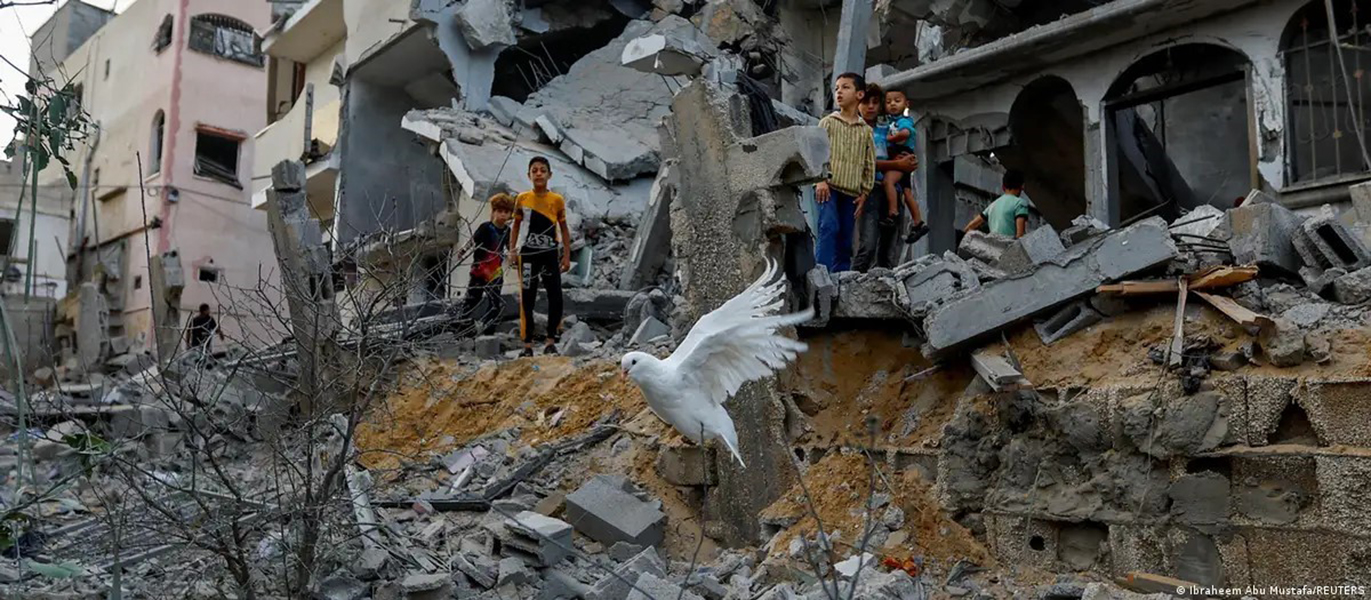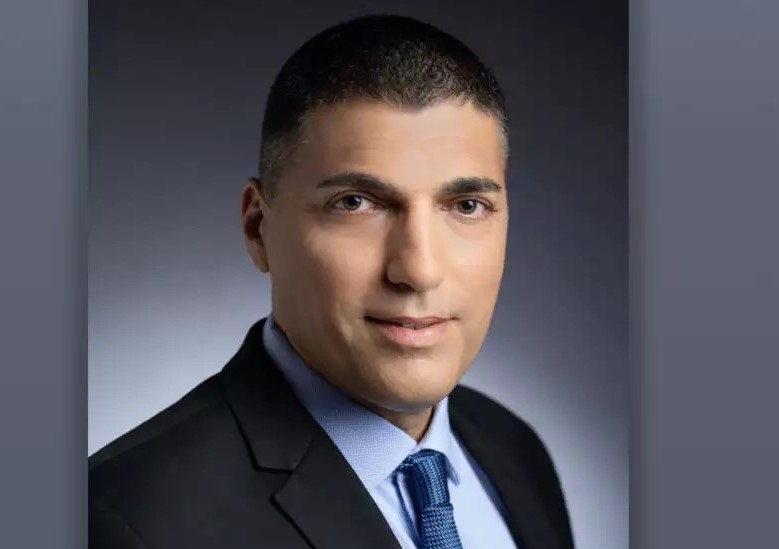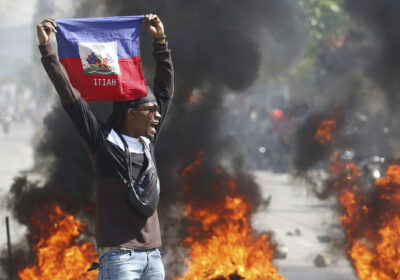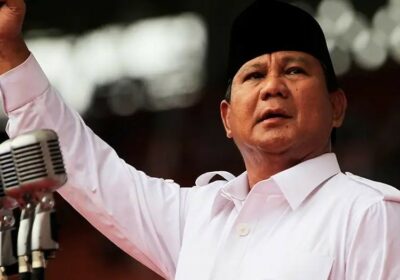JERUSALEM AND AFRICA DIFFICULT TO CONQUER

What is happening in Palestine is only (unfortunately) a paragraph in a millennial story, which must, however, be followed and understood. The situation on the ground has profoundly changed: Israel can count on the deployment of a myriad of eyes that never lose sight of Gaza: drones, cameras – the Red Wolf system, a capillary network of cameras and sensors, the flagship of the Israeli hi-tech industry dedicated to mass surveillance in Palestine -, soldiers on guard, undercover agents, close coordination by intelligence services such as the Mossad, the Shin Bet or the IDF that do not skimp on intense controls on computer networks and telecommunications, counting on one of the most aggressive and sophisticated espionage industries, or at least this is what we have known so far.
Yet the unprecedented massive aggression launched by Hamas on 7 October, which cost several hundred lives, reveals an incredible unpreparedness on the part of the Israeli defence. The multi-pronged attack, carried out with the launching of thousands of Qassam missiles – which threw the Iron Dome defence system into crisis – and the apparently unimpeded crossing of the border by hundreds of Hamas militants into Israeli territory, certainly needed months of planning, with the help of allies such as Hezbollah and Iran, months during which nothing seems to have leaked out. An inexplicable failure of the intelligence services, services that over the years have earned an aura of invincibility through various successes.
How much of this failure can be traced back to the intelligence world itself or to politics is hard to say: assigning responsibility to agencies is a recurring practice, especially when looking for an easy scapegoat, but often these situations are the result of politicians letting their guard down. The osmosis between intelligence and the political universe in Israel is a well-known fact. Not infrequently, members of the services end up in leading roles in politics, especially in diplomacy. This is the case of Ronen Levi, codenamed “Maoz”, whose enlistment is part of a policy of rapprochement and diplomatic reconquest of several African countries.
Between victories and failures

1958: The Israeli Foreign Minister, Golda Meir, visits Ghana[1]
During the 1950s, Israel carried out intense diplomatic activity in sub-Saharan Africa: for the then Foreign Minister Golda Meir, Africa was a top priority. As early as 1970, diplomatic relations were established with about 30 African countries, but these were abruptly interrupted by the Yom Kippur war, which led to the oil embargo imposed by the Gulf monarchies, creating a deep rift between Israel and Africa, especially after following a resolution by the Organisation for African Unity and under pressure from the Arab League, in 1975 19 African countries voted in favour of UN Resolution 3379 (later revoked in 1991), which denounced Zionism as a form of racism and racial discrimination[2] .
In 1978, thanks to the Camp David Accords and the normalisation of relations between Israel and Egypt[3] , a new rapprochement begins, also strengthened by the Oslo Accords[4] ; but this is not enough, Israel still does not obtain Africa’s diplomatic support in multilateral forums. From 2009 onwards, under the leadership of Benjamin Netanyahu, who declares ‘Israel is coming back to Africa and Africa is coming back to Israel’[5] , the issue becomes central again. We need to break down the wall of anti-Israeli prejudice in multilateral forums, especially in the UN General Assembly, where Africa has as many as 45 seats: suffice it to say that in 2018 only seven countries (Cape Verde, Eritrea, Lesotho, Liberia, Malawi, Rwanda and South Sudan) voted in favour of a resolution tabled by the United States condemning Hamas attacks on Israeli territory.
The hard work of diplomacy leads to undoubted achievements: today, Israel maintains diplomatic relations with 39 of the 54 African states recognised by the UN and there are 13 Israeli embassies in Africa: Kenya, Ethiopia, Angola, South Africa, Cameroon, Ivory Coast, Egypt, Eritrea, Ghana, Nigeria, Rwanda, Senegal and South Sudan[6] . The African states that today refuse to recognise the State of Israel are Algeria, Comoros, Djibouti, Mali, Niger, Somalia and Tunisia.
Behind the African continent’s desire for rapprochement, there are also important developments that reshape the balance on the world stage: the US is withdrawing from the Middle East, loosening its influence, China is signing important trade contracts with Iran as part of the Belt and Road Initiative (BRI) project, Russia is exerting extensive political/economic pressure in much of sub-Saharan Africa, fuelled by recent developments related to the war in Ukraine. Then there is the Israeli-Palestinian issue: Africa’s support for Israel could be an extra gear in defeating Hamas, which is known to be financed by countries such as Qatar, Syria, Saudi Arabia and Iran, the latter having now become the main supporter.
The recent attack by Hamas on Israel is an important litmus test of the success of the diplomatic work carried out. In a public statement, Kenyan President William Ruto said that he ‘joins the rest of the world in solidarity with the State of Israel and unequivocally condemns terrorism and attacks on innocent civilians in the country. There is no justification for terrorism, which poses a serious threat to international peace and security’. A clear signal of solidarity.
Zambia, Ghana[7] and the Democratic Republic of Congo are also among the African nations that have aligned themselves with Israel’s position. But the continent is still divided, with Algeria declaring ‘full solidarity with Palestine’. The African Union Commission led by Moussa Mahamat Faki (Chadian politician and current chair of the AU Commission), while expressing concern about the violence, accuses the ‘denial of the Palestinians’ fundamental rights’ and calls for a two-state solution. South Africa, denounces the escalation of violence but is clear in claiming that the conflict has arisen from Israel’s “continued illegal occupation of Palestinian land, the continued expansion of settlements, the desecration of the Al Aqsa mosque and Christian holy sites, and the continued oppression of the Palestinian people”, offering itself as a mediator[8] .
The rapprochement therefore still has a long way to go: one has to reckon with countries that, for the most part, have suffered brutal colonial rule, and anti-Western sentiment is hard to eradicate, there is a natural coldness towards the newborn Israel while on the other hand there is sympathy towards the struggle of the Palestinians driven from their lands and homes since 1948.
From Shin Bet to politics: intelligence as a diplomatic tool

The Director General of the Ministry of Foreign Affairs Ronen Levi[9]
Alon Ushpiz, director general of the Ministry of Foreign Affairs, announced his resignation on 15 January this year. His post was assigned to Ronen Levi, 48, who was born and raised in Moshavim, near the city of Netivot. He is fluent in Arabic and has been a leading figure in the National Security Council in the Arab world and Africa. A graduate in behavioural sciences, business management and economics from Ben-Gurion University, he holds a degree from the Peres Academic Center[10] .
Chosen by Foreign Minister Eli Cohen, Ronen Levi is a character who boasts a decisive past in Israeli diplomatic relations with numerous countries, an intense activity carried out in the shadows: his face and his real name are only revealed after his election. Known by the code name ‘Maoz’ (stronghold), he has worked for twenty years in the Shin Bet, the internal intelligence agency, and is considered one of Hamas’ top experts, with numerous undercover operations in the Gaza Strip to his credit. He immediately stands out for his fruitful activities in the field, almost to the point of being referred to as a mythological figure: it is said that, in 2015, having arrived at the site of the attack on the Beer Sheva central station, he was able to recognise the family affiliation of the terrorist based only on facial features and without seeing any identification documents. His hunches later proved to be correct[11] .
Appointed in 2017 as head of the special relations office in the National Security Council (NSC), then headed by Meir Ben-Shabbat, he is put in charge of a division to act as an emissary for special missions: one of his main tasks is to promote relations with Egypt and prevent clashes between Israel and Hamas in Gaza with the help of the Egyptians themselves. It is thanks to his close relations with Egypt, with which he builds a dense and reliable network, that he succeeds in controlling and containing the reactions of Hamas[12] .
He deals with countries with which Israel has no formal relations, becoming Prime Minister Benjamin Netanyahu’s special envoy in the Middle East and Africa[13] . And it is precisely at this stage that Levi begins to distinguish himself for his mediation skills: due to his singular emotional intelligence and ability to quickly identify the way of thinking of his interlocutors[14] , he is described by Minister Cohen himself as ‘one of the most experienced and creative individuals in linking and strengthening international ties for Israel’, thus becoming the silent protagonist in numerous important diplomatic meetings[15] .
Levi plays an important role in the re-establishment of diplomatic relations with Chad, which had been interrupted for 47 years: in 2019, a phase of rapprochement begins, thanks in part to the will of the then President Idriss Déby Itno. But after the latter’s death in 2021 due to the serious injuries he suffered in a firefight with a rebel group, the path becomes complicated again. For the interim president who succeeded him, Mahamat Idriss Déby, re-establishing relations with Israel is not a priority, but the intervention of the Mossad, which is working intensively in many areas of Africa[16] , succeeds in reversing the course. Careful diplomatic work leads to the opening of a Chadian embassy in Jerusalem in February 2022: according to some diplomatic sources, the director of the rapprochement is Ronen Levi[17] .
In the second half of 2020, he plays a central role in the achievement of the Abraham Accords, made to normalise relations between Israel, the United Arab Emirates, Bahrain, Sudan and Morocco. Levi meticulously prepares the meeting by paving the way through numerous secret diplomatic interventions in Sudan, and that is when he begins to collaborate with the then Minister of Intelligence, Eli Cohen, who was appointed by Netanyahu to coordinate the establishment of relations with Sudan[18] . Levi remained a central figure in the establishment of ties between Israel and Bahrain, the United Arab Emirates – he personally met the Emirates Minister of Foreign Affairs, Abdullah bin Zayed Al Nahyan[19] – and the United States, within the framework of the Abraham Agreements. Together with Ben Shabat, his intense diplomatic activity continued even after the agreements with numerous meetings with senior officials of the countries involved[20] . Mossad, however, does not like the work of ‘Maoz’, because ‘the efforts of Meir Ben-Shabbat and Maoz to maintain ties with the countries in the region bypass Mossad’[21] .
Following the success of the Abraham Agreements, a new normalisation process is launched, in which Israel, India, the United Arab Emirates and the United States take part and which, meeting in 2021, will become the I2U2 Group. The inaugural summit, at which Ronen Levi delivers the keynote address[22] , takes place on 14 July 2022: the group aims to intensify economic cooperation by focusing on topics such as water, energy, transport, space, health and food security[23] . In September of this year, the corresponding website[24] was launched with great fanfare.
At the beginning of June 2023, Ronan Levi’s work focuses on Azerbaijan, with which he initiates rather fruitful relations[25] sealed by a series of meetings[26] that end with a triumphant public announcement: Israel and Azerbaijan will enter into close cooperation; Hikmat Hajiyev, Azerbaijan’s presidential foreign policy advisor, expresses his gratitude to Ronen Levi for his achievements[27] .
In August 2023, Israel took another important diplomatic step: the so-called historic meeting in Rome between Israeli Foreign Minister Eli Cohen and his Libyan counterpart Najla Mangoush, mediated by Italian Foreign Minister Antonio Tajani. It is the first-ever diplomatic contact between the two countries and, once again, Ronen Levi is one of the protagonists: the meeting is the fruit of at least 10 years of secret diplomatic relations with the Mossad, which, despite its discontent, continues its shadowy diplomatic activity[28] . But something goes wrong.
The operation is planned in great secrecy, but Israeli Minister Eli Cohen speaks publicly about it after the meeting is over, triggering a diplomatic case. In the eastern parts of Libya, spontaneous demonstrations burn Israeli flags in the streets, the Libyan opposition rises up with harsh protests, to the point that Foreign Minister Najla Mangoush is forced to flee to Turkey; her post is suspended, an interim replacement is appointed in her place, the Presidential Council of Libya calls for an investigation[29] . Mangoush tries to defend himself by asserting that he had “always refused to meet with any Israeli representative, and that the meeting was unplanned and therefore unofficial”, but it is of little use. A few hours later, the minister’s office issued a statement: ‘Libyan Prime Minister Abdel Hamid Dbeibeh met with Italian Prime Minister Meloni and agreed that this ministerial meeting (with Cohen) would take place’ and that Najla Mangoush had made a false assertion in obedience to a request by the prime minister himself to avoid embarrassment. Too bad he then suspended her for this[30] .
The action also arouses the indignation of the Jihadists who declare: ‘We bitterly condemn the normalisation meeting between the Zionist foreign minister and the Libyan foreign minister. This meeting represents a dangerous retreat from the values of the nation and a plunge into the quagmire of normalisation. We trust that the Libyan people will not accept such meetings’[31] . Levi is not intimidated and his talks continue: in September 2023, it is the turn of Bahrain where the former Shin Bet agent meets with what he calls his ‘dear friend’, Ambassador Dr. Sheikh Abdulla bin Ahmed Al Khalifa, Undersecretary for Political Affairs in Bahrain[32] . The meeting aims at building cooperation in the wake of the Abraham Agreements.
A future bound by uncertainty

In the normalisation of relations with African countries, a key objective for Israel, there is still a long way to go[33]
As a result of the Israeli-Palestinian conflict, the major diplomatic achievements with some African countries are now suspended, if not blurred: first of all, the Abraham Agreement is called into question, and Saudi Arabia decides to suspend the normalisation talks, risking to throw away three years of successes[34] . Netanyahu’s violent response pushes many demonstrators in support of Palestine onto the streets in Morocco, opposing normalisation with the Israeli government, while the Moroccan Islamic party Justice and Development, in the majority until the 2021 elections, praises the Hamas attack: “a natural and legitimate reaction to the daily violations” . [35]
Sudan restores diplomatic relations with Hamas sponsor Iran, and the date of the event is suspicious, to say the least: just the day before Hamas’ attack on Israel[36] . Egypt itself, which for years has been playing the traditional role of mediator, questions its position, blaming Israel for instigating the brutal attacks led by Hamas against Israeli civilians[37] . From 2022, Turkey also normalises diplomatic relations with Israel, but over the years President Recep Tayyip Erdoğan proves to be a fervent supporter of the Palestinian cause, maintains relations with Hamas and hosts members of the movement, which certainly does not make him a reliable partner[38] .
Hezbollah does not stand idly by and, despite the fact that today it has no clear need to engage in a direct confrontation with Israel – today it is the most powerful political party in Lebanon -, it nevertheless takes advantage of the instability to stage an albeit mild military offensive by launching a few rockets into Israeli-controlled Lebanese territory, thereby also fuelling the response against Israel by Palestinian factions from Lebanon, a game Hezbollah has been playing for years to show its solidarity with the Palestinian resistance[39] .
There is also another important aspect, namely that the current situation has diverted attention away from the conflict in Ukraine, and this is a double victory for Russia: the crises in Israel, Kosovo, Nagorno-Karabakh and Africa could suggest that Vladimir Putin is behind it, pulling the strings in some way – after all, he has been courting Hamas for years[40] and recently received its leader Ismail Haniyeh in Moscow[41] . It is certain that the President is exploiting the situation by fanning the flames to his advantage. The US will be completely absorbed by the Israeli crisis and how much of a gift this is to Russia depends on how long the conflict lasts. The NATO countries have already been registering fatigue in the consensus on war aid to Ukraine for a while now, and the current situation will only exacerbate this.
Developments in the Israeli-Palestinian conflict could lead to important consequences. The risk of a vast Middle Eastern destabilisation is always at the doorstep, never before has the fate, not only of the Palestinians, been in the hands of one man, Netanyahu. An attack on Hamas is pending, which, as announced, could be devastating and the consequences unpredictable, and it is here that the role of many countries in the area could change diplomatically towards Israel. The support of African countries for the Palestinian resistance for now seems to have the upper hand.
In the meantime, the United States, not too convincingly, is offering its logistical support by sending ships and fighter jets to the eastern Mediterranean along with a substantial package of weapons and ammunition, even though Biden is critical of his old partner’s bellicose determination: he asks that the interventions cause as few casualties as possible and that humanitarian aid corridors be guaranteed, even though he knows well that he is speaking into the wind. That wind is blowing towards Africa, the only real hope of mitigating Netanyahu’s revenge.
JPN012
[1] https://www.facebook.com/IsraelinGhana/posts/tbt-to-when-mrs-golda-meir-israels-foreign-minister-visited-ghana-in-1958-she-re/2733890539982257/
[2] https://ecf.org.il/issues/issue/1320
[3] https://history.state.gov/milestones/1977-1980/camp-david
[4] https://history.state.gov/milestones/1993-2000/oslo
[5] https://www.israelnationalnews.com/news/215621
[6] https://embassies.net/israel-embassy
[7] https://twitter.com/GhanaMFA/status/1711004783467765761?t=IQjt18KsW4z3isIFkdbsIQ&s=19
[8] https://www.semafor.com/article/10/10/2023/africa-responds-to-hamas-attack-on-israel
[9] https://www.israelhayom.co.il/news/geopolitics/article/13585652
[10] https://www.gov.il/en/departments/people/ronen-levi-cv
[11] https://www.israelhayom.co.il/news/geopolitics/article/13585652
[12] https://www.israelhayom.co.il/news/geopolitics/article/13585652
[13] https://www.timesofisrael.com/foreign-ministry-director-general-resigns-key-intelligence-official-to-step-in/
[14] https://www.israelhayom.co.il/news/geopolitics/article/13585652
[15] https://www.timesofisrael.com/foreign-ministry-director-general-resigns-key-intelligence-official-to-step-in/
[16] https://formiche.net/2021/11/mossad-attentati-iran-africa/
[17] https://formiche.net/2023/01/nome-in-codice-maoz-chi-e-il-nuovo-capo-dei-diplomatici-israeliani/.
[18] https://www.israelhayom.co.il/article/844067
[19] https://www.mofa.gov.ae/en/mediahub/news/2023/2/22/22-02-2023-uae-israeli
[20] https://www.israelhayom.co.il/news/geopolitics/article/13585652
[21] https://www.timesofisrael.com/foreign-ministry-director-general-resigns-key-intelligence-official-to-step-in/
[22] https://usuaebusiness.org/events/state-department-announces-i2u2-private-enterprise-partnership/
[23] https://www.usip.org/publications/2022/07/what-you-need-know-about-i2u2
[24] https://telecom.economictimes.indiatimes.com/news/satcom/india-israel-uae-us-announce-space-venture/103878586?redirect=1
[25] https://nuhcixan.az/news/siyaset/87460-azerbaycan-sefiri-ve-israil-xin-in-bas-direktoru-emekdasliq-meselelerini-muzakire-edibler
[26] https://apa.az/en/foreign-policy/azerbaijani-ambassador-met-with-director-general-of-israel-mfa-407158
[27] https://caliber.az/en/post/188760/
[28] https://www.ynetnews.com/article/syi4vkta3
[29] https://www.ynetnews.com/article/bk006ehyp3
[30] https://www.ynetnews.com/article/b1ca2zqth#autoplay
[31] https://www.ynetnews.com/article/syi4vkta3
[32] https://7enews.net/en/news-en/ronen-levi-we-have-commenced-our-working-sessions-in-bahrain-with-ambassador-abdulla-bin-ahmed/
[33] https://www.aljazeera.com/features/2023/10/14/israel-hamas-war-why-is-africa-divided-on-supporting-palestine
[34] https://www.anews.com.tr/middle-east/2023/10/14/saudi-arabia-pauses-talks-on-normalising-ties-with-israel-source
[35] https://foreignpolicy.com/2023/10/11/israel-hamas-morocco-sudan-abraham-accords/
[36] https://sudantribune.com/article278174/
[37] https://www.ispionline.it/en/publication/hamas-israel-escalation-the-risk-of-a-regional-spillover-147871
[38] https://www.ispionline.it/en/publication/hamas-israel-escalation-the-risk-of-a-regional-spillover-147871
[39] https://www.timesofisrael.com/liveblog_entry/lebanon-says-hezbollah-has-promised-not-to-join-war-unless-israel-harasses-country/
[40] https://www.aljazeera.com/news/2006/2/9/putin-to-invite-hamas-to-moscow
[41] https://www.timesofisrael.com/russias-lavrov-meets-with-hamas-politburo-chief-haniyeh-in-moscow/




Leave a Reply